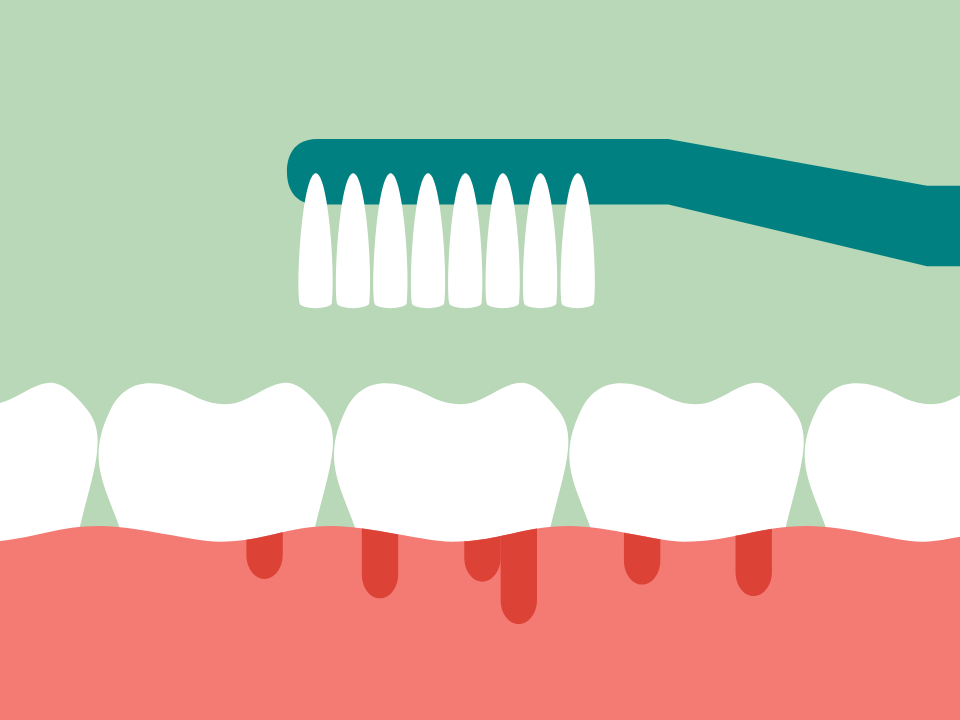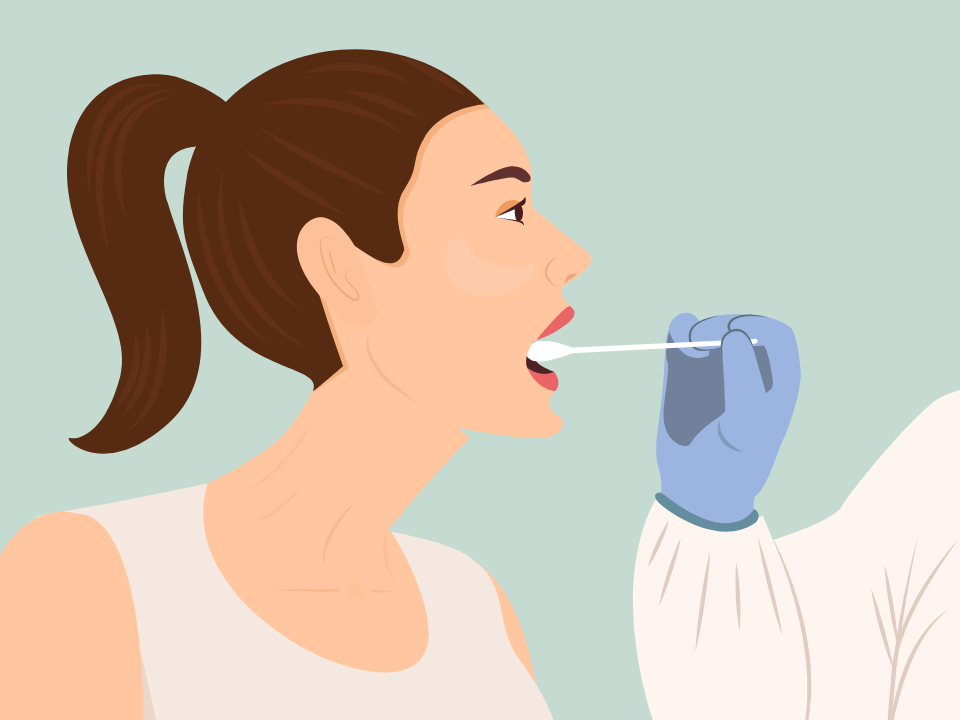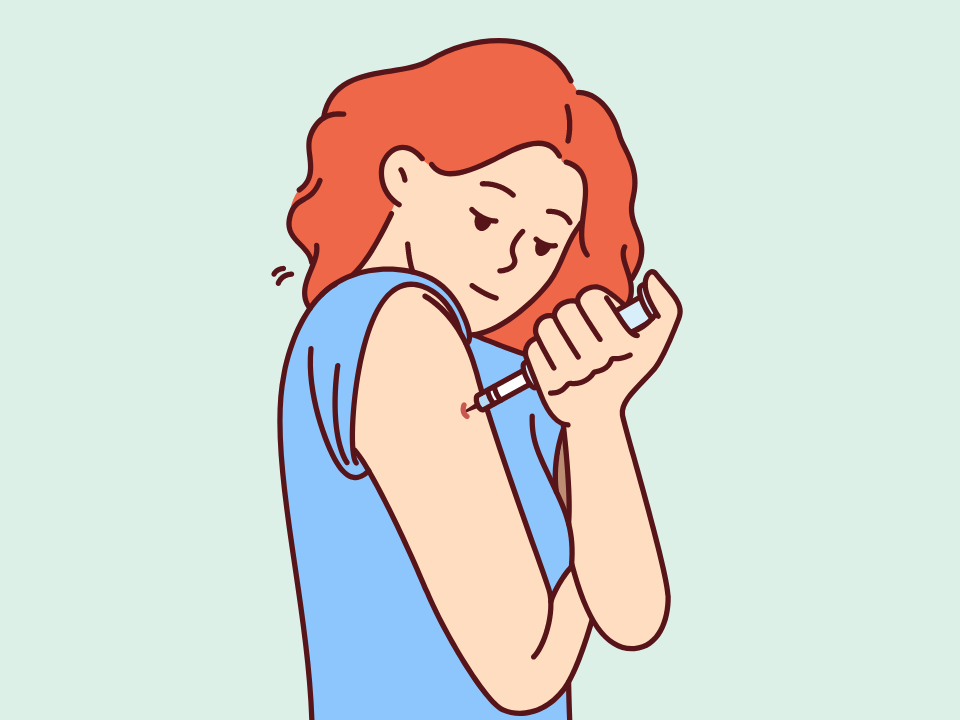Did you know that brushing your teeth more frequently could help protect you from developing diabetes? Recent studies are uncovering a surprising link between oral health and chronic conditions like diabetes. Here’s what you need to know.
What is the Link between Oral Health and Diabetes?
Key Things to Know:
High blood sugar from diabetes weakens the immune system, increasing the risk of oral infections like gingivitis, periodontitis, and thrush.
Common diabetic symptoms such as dry mouth and reduced saliva can lead to painful sores, tooth decay, and the spread of bacteria to other parts of the body.
Dentists can often detect early signs of diabetes through oral symptoms, making regular dental visits an important part of diabetes awareness and prevention.
The link between oral health and diabetes is high blood sugar. Diabetes weakens the body’s ability to fight infection and increases inflammation, both of which have an effect on oral health. If the body has a decreased ability to fight infection, there is an increased risk of bacteria in the mouth developing into serious conditions such as gingivitis and periodontitis when left unchecked by the immune system.
Many diabetics have other issues such as dry mouth, meaning there is less protective saliva doing its job in the mouth. Less saliva can lead to painful sores in the mouth and tooth decay, which in turn can lead to infection in other parts of the body as bacteria gains access to major systems like the circulatory and respiratory systems. Thrush and a burning sensation are other symptoms that diabetics often face in their oral health.
What The Studies Found
Researchers in Europe found that brushing three times a day or more is linked to an 8% lower risk of developing diabetes. Additionally, just having an oral disease is associated with a 9% increased risk of developing diabetes. For people missing 15 or more teeth, this risk increases to 21%.
Diabetes is a chronic health condition that can have far-reaching effects on the body as a whole. The food we consume is turned into glucose, a primary source of energy for cells, which enters the bloodstream. The pancreas is then supposed to release insulin once blood sugar reaches a certain level; insulin is a hormone that helps the glucose move into the cells to be used for energy. When someone has diabetes, the body either does not produce the appropriate amount of insulin (insulin deficiency) or doesn’t respond properly to the insulin that is made (insulin resistance).
How Can Dentists Help With Diabetes?
Because there are so many signs of diabetes that present themselves orally, a thorough examination by a dentist may actually be a great tool for early detection of diabetes if you haven’t yet been diagnosed. Can a dentist tell if you have diabetes? Signs like thrush, dry mouth, and burning sensations in the mouth and throat are red flags that may alert your dentist to an underlying concern. Furthermore, a dentist will know that missing teeth, indicating diabetes or prediabetes, maybe more than just an oral health issue.
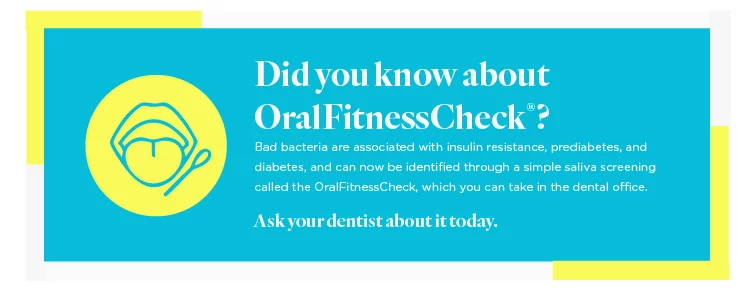
Can Brushing More Reduce The Risk of Diabetes?
Key Things to Know:
Brushing three times a day can reduce the risk of developing diabetes by 14% in individuals aged 51 or younger, compared to those who brush once a day or less.
Brushing twice daily lowers diabetes risk by 10% for the same age group, showing a clear benefit from improved oral hygiene habits.
For adults aged 52 and older, brushing three or more times a day still reduces diabetes risk by 7%, though twice-daily brushing shows no significant impact.
It’s clear that the balance between blood sugar and insulin impacts many different parts of the body, including oral health. Traditionally, diabetes has been recognized to have a significant impact on oral health — but a recent study has shown that there may be a correlation between good oral hygiene habits and lowering or increasing the risk of diabetes.
Does brushing your teeth help with diabetes? A study published in Diabetologia from the European Association for the Study of Diabetes states that, after accounting for factors such as sex, socioeconomic class, and weight, amongst others, good oral hygiene habits such as brushing three times a day could actually reduce the risk of developing diabetes.
Age, Brushing, and the Risk of Diabetes
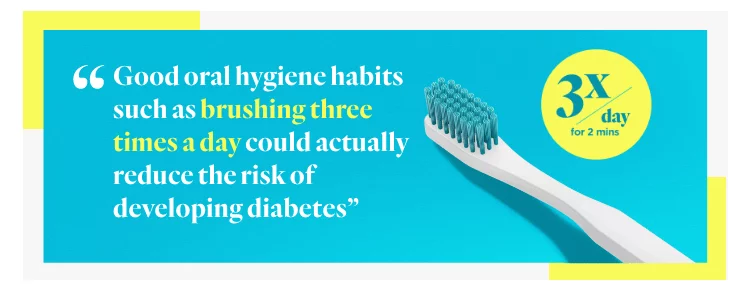
What Does Brushing Your Teeth Do?
Key Things to Know:
Brushing at least twice a day for two minutes helps prevent plaque buildup, enamel erosion, gum disease, and tooth loss, according to the American Dental Association.
People who brush multiple times daily have lower glucose levels in their saliva, which may positively influence fasting blood sugar and insulin, as noted by the National Library of Medicine.
Brushing three times a day may reduce the risk of developing diabetes, reinforcing the link between strong oral hygiene and better overall health, per findings published in Diabetologia.
Brushing your teeth is a crucial part of oral health. Brushing thoroughly and for the appropriate amount of time can prevent issues that will negatively affect your oral health as well as your overall health.
As we eat, bacteria and plaque build up in the mouth, potentially leading to diseases that affect the teeth and gums and increasing the likelihood of tooth loss. Brushing helps remove the plaque and bacteria that, if left alone and allowed to multiply, will eat away at the enamel of the teeth. Once the enamel begins to break down, there is an increased risk of cavities and tartar buildup. Tartar can lead to gum disease and inflammation in the mouth, which can spread to other parts of the body.
Properly brushing your teeth multiple times a day can prevent the damage caused by the buildup of plaque and bacteria. Keeping the teeth free of these damaging agents decreases the likelihood that tartar will build up and cause inflammation. Tooth loss often occurs as a result of tooth decay and gum disease, so brushing can also help minimize the risk of losing teeth unnecessarily.
Does brushing teeth increase insulin and affect fasting blood sugar? It may come as a surprise but brushing teeth can potentially affect the glucose levels in saliva, fasting blood sugar, and insulin as a whole, according to information published by the National Library of Medicine. For example, people who brushed multiple times a day were found to have lower levels of glucose in saliva than those who only brushed once or not at all.
How Often Should You Brush Your Teeth?
According to the American Dental Association, it’s best to brush your teeth at least twice a day for a minimum of two minutes each time. Following this guideline will ensure good oral hygiene will help prevent issues like tooth decay and tooth loss.
However, by adding in just one extra brushing you may actually reduce the risk of developing diabetes by going the extra mile and brushing three times a day, based on the study published in Diabetologia.
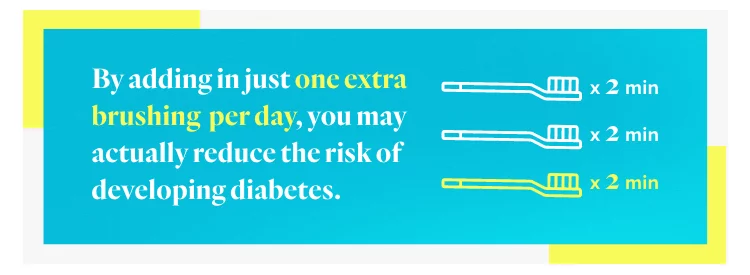
How Brushing Reduces the Risk of Diabetes
Key Things to Know:
Brushing three times a day helps prevent plaque buildup and infection, which can otherwise trigger immune responses that disrupt blood sugar control and increase diabetes risk.
Infections caused by poor oral hygiene can impair insulin response, potentially leading to or worsening diabetes as bacteria enter the bloodstream.
Using sugar-free toothpaste may lower glucose levels in saliva, supporting better overall blood sugar management for both diabetics and non-diabetics.
Brushing bacteria and plaque off the surfaces of your teeth is not just about keeping your oral health in tip-top shape; by preventing a toxic environment where bacteria can thrive, you may actually prevent a plethora of ailments throughout multiple systems of the body — in particular, diabetes.
Bacteria and plaque buildup can lead to infection, and infection triggers an immune response by the body. This trigger can actually impede blood sugar control as the infection circulates through the bloodstream. Impairment of blood sugar control can impact the body’s response to insulin production, increasing the risk of diabetes. So, can teeth cleaning lower blood sugar?
It's important to brush the appropriate number of times per day and for the correct length of time, but it’s equally important to use the right toothpaste when it comes to glucose levels in saliva, and consequently overall glucose levels. Does Toothpaste affect diabetes? Sugar-free toothpaste has been shown to lower the level of glucose in the saliva of diabetics and non-diabetics alike.
Our bodies are an amazing, intricate network of interconnected systems. Just as we have the ability to negatively impact health by our choices, we also have the ability to positively impact it. Caring for your oral health by brushing three times a day can not only improve the health of your teeth and gums, but it can improve your overall health in many ways — such as potentially reducing the risk of developing diabetes. If you are looking for a capable, qualified dentist to help you improve your oral and overall health, use Smile Generation’s Find a Dentist tool to find a dental professional near you.
Find your trusted, local dentist today!
Sources
- Chang, Y., Lee, J. S., Lee, K. J., et al. (2020). Improved oral hygiene is associated with decreased risk of new-onset diabetes: A nationwide population-based cohort study. Diabetologia, 63, 924–933. https://link.springer.com/article/10.1007/s00125-020-05112-9 (Reviewed April 18, 2025)
- Gordon, S. (2020, March 3). Want to help keep diabetes at bay? Brush & floss. WebMD. https://www.webmd.com/diabetes/understanding-diabetes-detection-treatment (Reviewed April 18, 2025)
- Centers for Disease Control and Prevention. (2021, May 7). Diabetes and oral health. U.S. Department of Health and Human Services. https://www.cdc.gov/diabetes/diabetes-complications/diabetes-and-oral-health.html (Reviewed April 18, 2025)
- Martin, L. (n.d.). Diabetes and your smile. MouthHealthy – American Dental Association. https://www.mouthhealthy.org/all-topics-a-z/diabetes/ (Reviewed April 18, 2025)
- Cleveland Clinic. (2019, August 29). Oral health problems and diabetes. https://my.clevelandclinic.org/health/diseases/11263-oral-health-problems-and-diabetes (Reviewed April 18, 2025)
- Centers for Disease Control and Prevention. (2021, December 16). What is diabetes? U.S. Department of Health and Human Services. https://www.cdc.gov/diabetes/about/ (Reviewed April 18, 2025)
- Mayo Clinic. (2021, August 7). Diabetes treatment: Using insulin to manage blood sugar. https://www.mayoclinic.org/diseases-conditions/diabetes/in-depth/diabetes-treatment/art-20044084 (Reviewed April 18, 2025)
- Salinas, T. (2021, October 7). When and how often should you brush your teeth? Mayo Clinic. https://www.mayoclinic.org/healthy-lifestyle/adult-health/expert-answers/brushing-your-teeth/faq-20058193 (Reviewed April 18, 2025)
- Kapadia, J., et al. (2017). Effect of sugar-free and regular toothpaste on salivary glucose and pH among type 2 diabetes: A randomized crossover trial. Journal of Clinical and Diagnostic Research, 11(7), ZC71–ZC75. https://jcdr.net/article_fulltext.asp?issn=0973-709x&year=2017&volume=11&issue=7&page=ZC71&issn=0973-709x&id=10250 (Reviewed April 18, 2025)
- Su, L., et al. (2016). Toothbrushing, blood glucose, and HbA1c: Findings from a random survey in Chinese population. Scientific Reports, 6, 28824. https://www.nature.com/articles/srep28824 (Reviewed April 18, 2025)
Smile Generation blog articles are reviewed by a licensed dental professional before publishing. However, we present this information for educational purposes only with the intent to promote readers’ understanding of oral health and oral healthcare treatment options and technology. We do not intend for our blog content to substitute for professional dental care and clinical advice, diagnosis, or treatment planning provided by a licensed dental professional. Smile Generation always recommends seeking the advice of a dentist, physician, or other licensed healthcare professional for a dental or medical condition or treatment.






